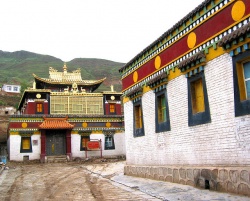Difference between revisions of "Rongwo Monastery"
(Created page with "thumb|250px| Rongwo Monastery (Wylie: Rong Bo) also known as Longwu in Chinese is a Tibetan Buddhist monastery in Tongren, Huangnan Prefecture, Q...") |
|||
| (4 intermediate revisions by one other user not shown) | |||
| Line 1: | Line 1: | ||
[[File:Rongwo_Monastery.jpg|thumb|250px|]] | [[File:Rongwo_Monastery.jpg|thumb|250px|]] | ||
| − | Rongwo Monastery (Wylie: Rong Bo) also known as Longwu in Chinese is a Tibetan Buddhist | + | Rongwo [[Monastery]] (Wylie: Rong Bo) also known as [[Longwu]] in {{Wiki|Chinese}} is a [[Tibetan Buddhist]] [[Monastery]] in Tongren, Huangnan Prefecture, {{Wiki|Qinghai}}, [[China]] (known as Rebkong Town in [[Amdo]] to [[Tibetans]]) and is 186 km from Xining. |
| − | Name | + | [[Name]] |
| − | The | + | The [[Monastery]] is named after the Rongwo [[River]] upon which it is located ([[Tibetan]]: Rong Bo dGu CHu). The [[Tibetan]] [[Name]] of the [[Monastery]] is Rong Bo'i dGon Po, which means "[[Monastery]] of Rongwo", where dGon Po means [[Monastery]] and 'i is the genitive case marker. In colloquial [[Amdo]] [[Tibetan]], when the syllable BO is preceded by another syllable, BO is pronounced as WO, and when the vowel o is followed by 'i, the vowel undergoes a [[transformation]] and becomes u. therefore Rong Bo'i dGon po is pronounced as Rongwu Gonpo in [[Amdo]] [[Tibetan]], and hence the {{Wiki|Chinese}} imitation becomes "[[Longwu]]". |
| − | History | + | {{Wiki|History}} |
| − | Rongwu Monastery was initially established as a three temple site in 1341 in by Rongwu Samten Rinpoche. Samten’s younger brother was the architect and designer of the temples. The first temple built was the Temple of 3 Buddhas and then the Golden Temple and other temples. Shartsang Kaldan Gyatso (1607-1677) is recognized as the 1st re-incarnation of Rongwu Samten Rinpoche and is the founder of the | + | Rongwu [[Monastery]] was initially established as a three [[temple]] site in 1341 in by Rongwu [[Samten]] [[Rinpoche]]. Samten’s younger brother was the {{Wiki|architect}} and designer of the [[temples]]. The first [[temple]] built was the [[Temple]] of 3 [[Buddhas]] and then the Golden [[Temple]] and other [[temples]]. Shartsang Kaldan Gyatso (1607-1677) is [[recognized]] as the 1st [[re-incarnation]] of Rongwu [[Samten]] [[Rinpoche]] and is the founder of the [[Monastery]] at the [[temple]] sites. The 8th [[re-incarnation]] was [[recognized]] in October 1991. Yarba Chogyi built the [[Prayer]] hall, the Victory [[Stupa]] and the [[Stupas]] at the 4 corners of the [[Monastery]], he had the sayings of [[Buddha]] written in {{Wiki|gold}} and commissioned the [[Statues]] of Tsong Kapa. Shartsang Gyatso established the 1st [[monastic]] college, Tsennyi Tratsang, in which [[Buddhist]] [[dialectics]] is taught in 1630. Following re-incarnations until the 7th [[incarnation]] of Shartsang, Lobsang Trinley Longtok Gyatso, gradually expanded the colleges to the present: the Tsennyi Tratsang, the Gyamat Tratsang (Lower [[tantric]] College or study/reading of the [[scriptures]]) and the Duikor Tratsang, a [[monastic]] college of the [[Wheel]] of [[Time]] also known as the college of [[Kalachakra]], the 10 syllable [[Mantra]]. This [[Information]] was provided at the [[Monastery]] in June 2006 and is translated from their official documents. [[Staff]] (6 February 2008). "[[Longwu]] [[Temple]] - garden of [[Tibetan Buddhism]] and Western Region". [[China]] Tour Guide. Retrieved 2010-02-04.</ref> |
| − | Rongwo Monastery is of the Gelukpa sect. | + | Rongwo [[Monastery]] is of the [[Gelukpa]] sect. |
{{W}} | {{W}} | ||
| Line 16: | Line 16: | ||
[[Category:Tibetan Buddhist monasteries]] | [[Category:Tibetan Buddhist monasteries]] | ||
[[Category:Buddhist Terms]] | [[Category:Buddhist Terms]] | ||
| + | [[Category:Mahayana Monasteries]] | ||
| + | [[Category:Mahayana Monasteries]] | ||
Latest revision as of 10:53, 17 September 2013
Rongwo Monastery (Wylie: Rong Bo) also known as Longwu in Chinese is a Tibetan Buddhist Monastery in Tongren, Huangnan Prefecture, Qinghai, China (known as Rebkong Town in Amdo to Tibetans) and is 186 km from Xining. Name
The Monastery is named after the Rongwo River upon which it is located (Tibetan: Rong Bo dGu CHu). The Tibetan Name of the Monastery is Rong Bo'i dGon Po, which means "Monastery of Rongwo", where dGon Po means Monastery and 'i is the genitive case marker. In colloquial Amdo Tibetan, when the syllable BO is preceded by another syllable, BO is pronounced as WO, and when the vowel o is followed by 'i, the vowel undergoes a transformation and becomes u. therefore Rong Bo'i dGon po is pronounced as Rongwu Gonpo in Amdo Tibetan, and hence the Chinese imitation becomes "Longwu". History
Rongwu Monastery was initially established as a three temple site in 1341 in by Rongwu Samten Rinpoche. Samten’s younger brother was the architect and designer of the temples. The first temple built was the Temple of 3 Buddhas and then the Golden Temple and other temples. Shartsang Kaldan Gyatso (1607-1677) is recognized as the 1st re-incarnation of Rongwu Samten Rinpoche and is the founder of the Monastery at the temple sites. The 8th re-incarnation was recognized in October 1991. Yarba Chogyi built the Prayer hall, the Victory Stupa and the Stupas at the 4 corners of the Monastery, he had the sayings of Buddha written in gold and commissioned the Statues of Tsong Kapa. Shartsang Gyatso established the 1st monastic college, Tsennyi Tratsang, in which Buddhist dialectics is taught in 1630. Following re-incarnations until the 7th incarnation of Shartsang, Lobsang Trinley Longtok Gyatso, gradually expanded the colleges to the present: the Tsennyi Tratsang, the Gyamat Tratsang (Lower tantric College or study/reading of the scriptures) and the Duikor Tratsang, a monastic college of the Wheel of Time also known as the college of Kalachakra, the 10 syllable Mantra. This Information was provided at the Monastery in June 2006 and is translated from their official documents. Staff (6 February 2008). "Longwu Temple - garden of Tibetan Buddhism and Western Region". China Tour Guide. Retrieved 2010-02-04.</ref>
Rongwo Monastery is of the Gelukpa sect.
